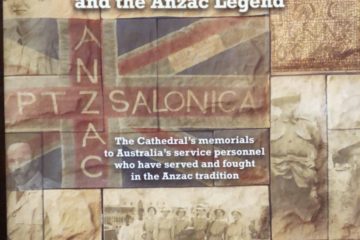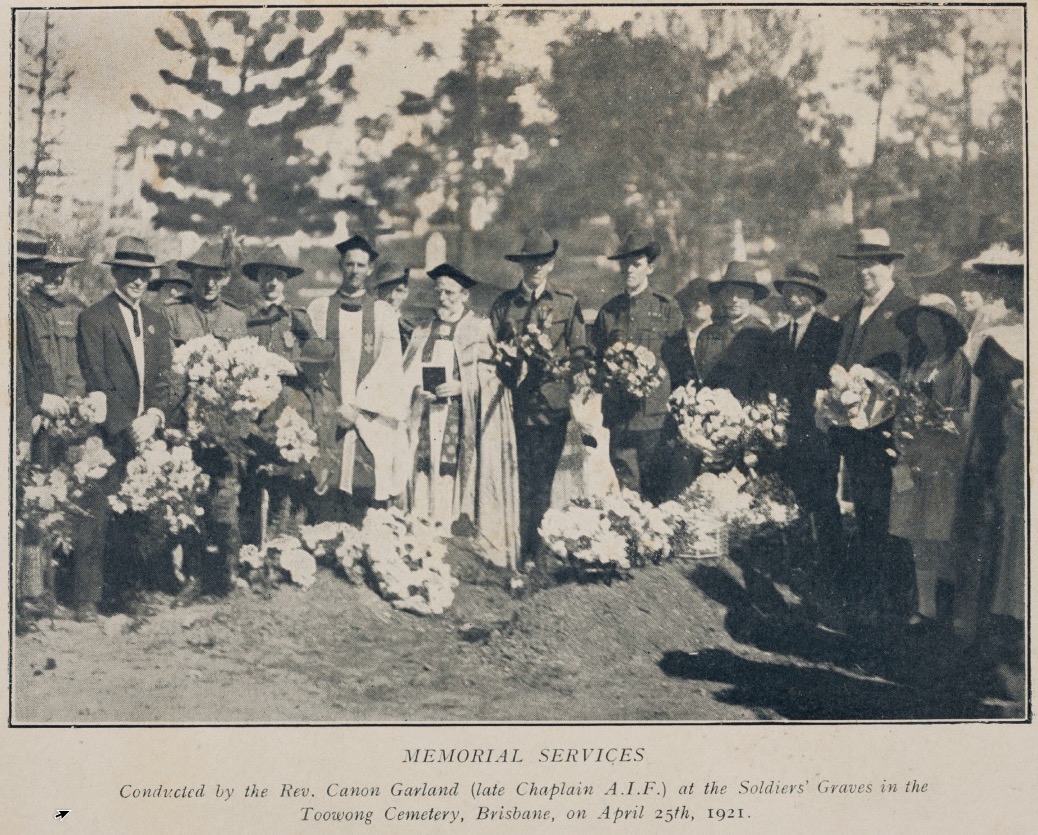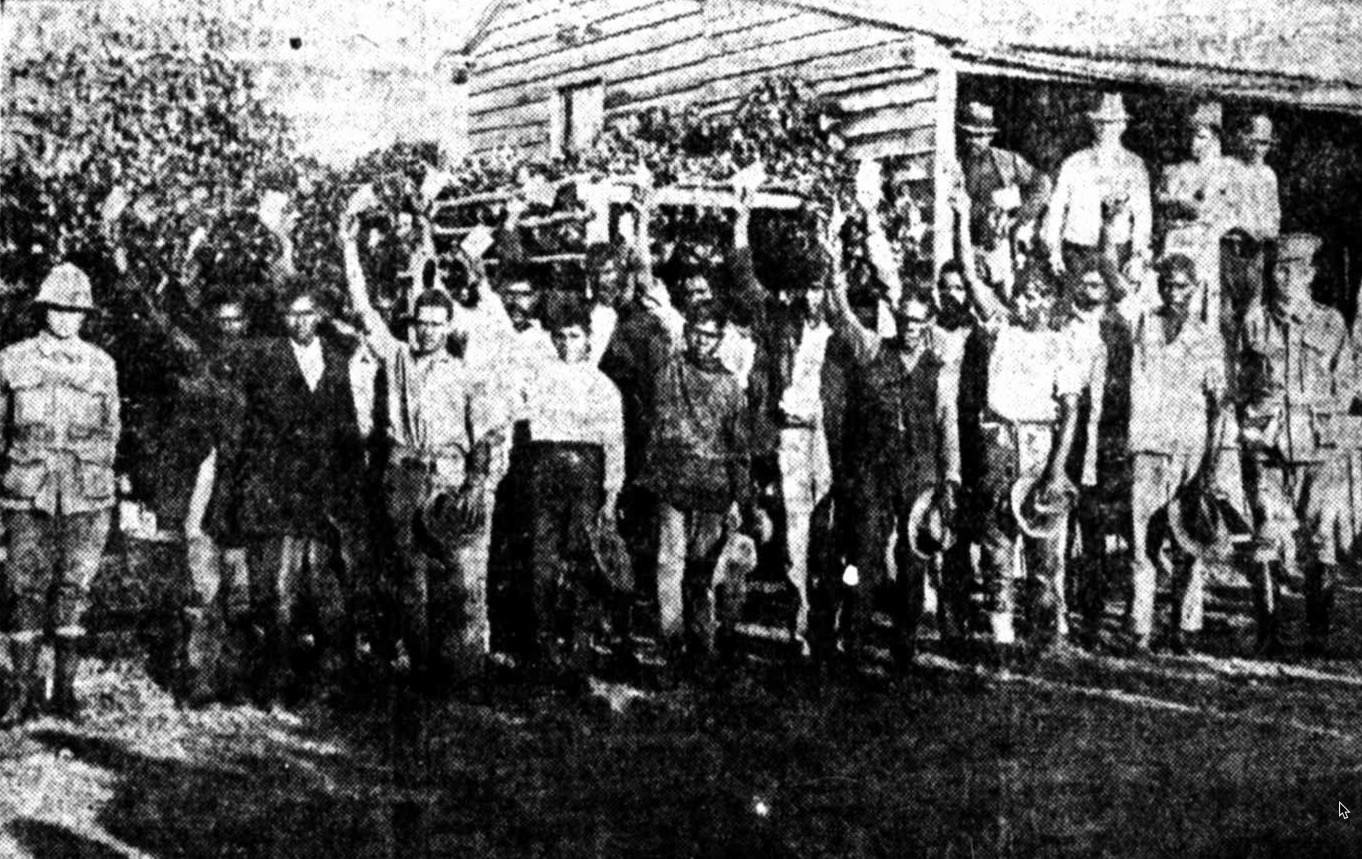Abstinence pledge
ABOVE: Some of the estimated 3,000 troops – including men from the Queensland-raised 26th Infantry Battalion, 11th Australian Light Horse regiment and other elements of the 7th Infantry Brigade – paraded through the streets of inner Brisbane on Saturday morning, 29 May 1915. The following Monday evening more than 700 Brisbane citizens pledged to abstain from drinking alcohol for the duration of the war, to show solidarity with His Majesty King George V. These photos appeared on page 7 of “The Brisbane Courier” of Monday, 31 May 1915.
“FOLLOW THE KING.”
MEETING IN THE EXHIBITION HALL.
As the outcome of a movement initiated some little time ago by the Queensland Temperance Alliance, a meeting of citizens was held in the Exhibition Hall [ Bowen Hills ] last evening [ Monday, 31 May 1915 ], when a motion was passed urging the people of Queensland to follow the example of the King in abstaining from alcohol during the war.
Alderman Down (Mayor of Brisbane) [ George Down ] presided, and others on the platform included his Excellency the Governor and Lady Goold-Adams [ Sir Hamilton John Goold-Adams and Lady Elsie Goold-Adams, neé Riordan ] (attended by Mr. Thatcher, Private Secretary) [ Thomas Thatcher ], his Grace, Dr Donaldson (Archbishop of Brisbane) [ St Clair George Alfred Donaldson ], Alderman Davey (Mayor of South Brisbane) [ James Davey ], Rev W. Smith (President of the Methodist Conference) [ William Smith ], Col. Moore, P.M. [ Richard Albert Moore ], Rev. W.N. Gunson (President of the Congregational Union) [ William Norman Gunson ], Lieut.-Col. Ferguson, V.D. [ George Andrew Ferguson ], Mr J. Spence Irvine (President of the Baptist Association) [ John Spence Irvine ], Rev. Dr Youngman [ Henry Youngman ], Rev. Canon Garland [ David John Garland ], Brigadier Harris (Salvation Army) [ Alfred James Stewart Harris ], Rev. F. de Witt Batty [ Francis de Witt Batty ], Hon. D.F. Denham [ Digby Frank Denham ], Mr D. Bowman, M.L.A. [ David Bowman ] and a number of other prominent citizens.
Prior to the meeting Mr Victor Galway, Mus. Bac., provided selections on the organ, and during an interval the Salvation Army Band also rendered selections.
The Mayor, in expressing appreciation of the honour he felt at presiding over such a great gathering, said he was heart and soul with the movement. (Applause.)
This was a fitting time for it, and the meeting was a guarantee of a noble result. For himself, from this time forth to the end of the war he would be a strict teetotaller. (Applause.)
Dr Donaldson moved:- “That this meeting of citizens expresses gratitude to his Majesty the King for his example in abstaining from alcohol and banishing it from the Royal Household during the war, and urges all citizens of Queensland to follow his Majesty’s example, this resolution to be cabled to his Majesty.” (Applause.)
It was only a little thing they were asked to do, said his Grace, yet it at once raised the question: Is your patriotism really true?
They all knew of the wonderful material resources of the Empire, they knew the heroic courage of its men, but the lessons of history taught them that it was not the outward and material things that won battles, it was the soul of the nation that counted in war. (Applause.)
It was only through the faithfulness to God that they could hope to win.
The awakening of the conscience of the Allies was shown when in Russia vodka was abolished, and in France absinthe was prohibited. (Applause.)
Great Britain, however, hesitated. They had public men stating that the greatest enemy of the Empire was drink, and they had heard stories of doings amongst the men of their own camps.
He knew in both cases there had been exaggeration, but at the same time there was too much truth in them, they had to admit that the besetting sin of the Anglo-Saxon race was drink.
He trusted the leaders, both in the old land and in Australia, but he was not so sure of the rank and file of the people.
His Majesty the King had gauged his people; he knew that they were not to he dragooned into things by arbitrary laws but they were to be led by example. His Majesty had set that example and it was for them to follow.
His Grace appealed to all to exercise the spirit of self-sacrifice in the cause of the Empire, and of the men who were fighting their battles. (Applause.)
Mr D. Bowman, M.L.A., seconded the motion in the unavoidable absence of Mr. T.J. Ryan, M.L.A. [ Thomas Joseph Ryan ]
Speaking as a life abstainer he said he realised very fully what an assistance it would be to the Empire if its people would renounce strong drink during this time of trial, and he felt sure that it would give great pleasure indeed to his Majesty to receive news of that resolution. (Applause.)
Mr Bowman expressed the pain he felt at the sacrifice of noble lives but it was a great cause which he hoped, would soon triumph over all the agencies of tyranny. (Applause.)
The Hon. D. F. Denham, in supporting the motion, said that to drink had been attributed the shortage of munitions so absolutely essential to success in the war.
He trusted that the resolution would find a hearty response throughout the Empire, and if only it struck a death-blow to drink some good would have come out of this awful war.
All lovers of the Empire, and all lovers of peace would sign the pledge that night.
They were all willing to give their sons and brothers to fight the Empire’s battles – would they not do something to support those sons and brothers by abstaining from drink? (Applause.)
Lieutenant-Colonel Ferguson who rose amid cheers for “Good old Ferguson and his men”, said they sometimes heard the men in the military camps represented as awful men.
He wished to say for them however, that they were good men, every bit as good as any other body of equal numbers, and if there were some who forgot themselves it was usually caused by civilians.
He knew of one case where a civilian had approached the man in charge of a military picket on duty in the city, and wanted to “shout” for the lot. When he was not allowed to do so he tried to press the money on the officer, so that the latter could “shout”.
Like Mr Bowman, he had been a lifelong abstainer, and would set that example to the men of the 26th Battalion, which he had the honour to command. (Applause.)
If the public would set that example also it would be good for themselves and for the men. (Applause.)
The motion was unanimously carried amid applause.
Lieutenant-Colonel Chaplain Garland apologised for the absence of the Hon. E.W.H. Fowles, M.L.C. [ Edwin Wesley Howard Fowles ]
He had been struck, be said, by the unity of the appeal, not only by the temperance bodies, but by the Churches, and he trusted others would follow the example of the Baptist Church, which was making an individual appeal to its members to “follow the King”. (Applause.)
To those who might be inclined to regard this as a move of the parsons, he would point out that the King himself, the greatest layman of the Empire, had set the example, and it had been taken up by the most eminent of the laity, including Lord Kitchener, Mr Lloyd George, the Governor-General of the Commonwealth, Governors of States, and the professions.
The Victorian Branch of the British Medical Association had passed a resolution in support of the movement. (Applause.)
The great force and moral effect of the meeting was touched on and an appeal made on behalf of the men who apart from the one failing of drink, were frequently the best and bravest of soldiers. (Applause.)
There had been 4,539 Australian casualties, and they provided 4,539 irresistible arguments in favour of the movement.
These men who had shed their blood for the Empire were heroes and the men in camp at Enoggera were also heroes.
The people had seen them march through the streets on Saturday last – it was a sight that had made them all feel too deeply to cheer. Every one had felt proud to see them go by so erect and so soldierly.
He had seen more; he had seen them doing the last of that 13 miles’ ride through the heat and dust without refreshment, and when there were no crowds to watch, but they were still the erect, steady soldiers. (Applause.)
They were heroes for another reason: Every man in that camp had read the casualty lists. Every man had marked the high percentage and realised exactly the chances he was taking.
He (Canon Garland) considered the bearing and determination of these men as even more heroic than the deeds of brave men in the excitement of actual battle. (Applause.)
It could be said of each of these: “Greater love hath no man that he lay down his life for his friends.” (Applause.)
Dr. Brockway (president of the Queensland branch of the British Medical Society) [ Archibald Birt Brockway ] moved a vote of thanks to the speakers.
He was sorry he said that he could not tell them that the Queensland branch of the Medical Association had passed a resolution similar to that of Victoria, but the reason was that its president was a teetotaller who felt that he could not ask his fellows to do something which he was not himself in a position to do. He was looking forward hopefully, however, to the next meeting on Friday. (Applause.)
Brigadier Harris (Salvation Army), in seconding the motion, said the Salvation Army members the world over were all total abstainers. (Applause.)
The motion was carried with applause and responded to by the chairman.
An invitation from his Worship that they express appreciation of the presence of the Governor and Lady Goold-Adams brought a cheer which his Excellency acknowledged and the meeting closed with the National Anthem.
During the evening approximately 700 pledges were signed.
– from page 10 of “The Brisbane Courier” of Tuesday, 1 June 1915.


